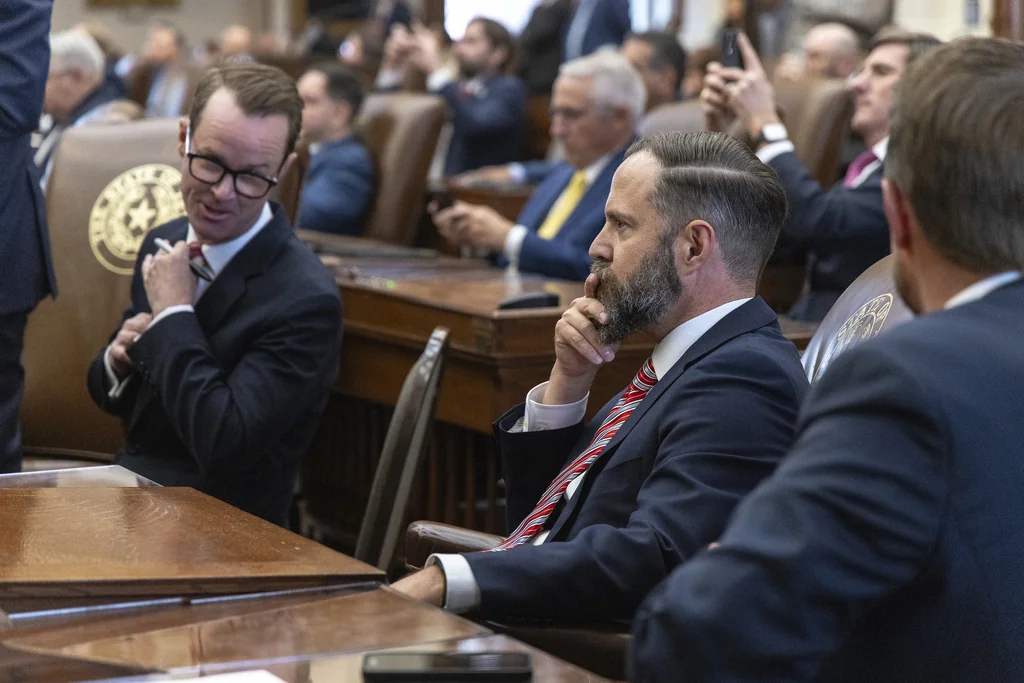While LGBT activists concede their movement is facing sweeping losses at the legal level, they argue there’s a silver lining to the defeats.
Legal and legislative victories by conservatives at the state level against the LGBT agenda are unquestionably wins for Republicans, whom President Donald Trump has led in opposing pro-pride policies. However, the defeats have also spurred pride activism at notable levels, giving LGBT leaders hope that grassroots growth will spur larger victories in the upcoming elections.
Florida
In Florida, Kristen Browde, president of the state’s LGBTQ Democratic Caucus, said she has witnessed the group’s membership rise by nearly 30% since Trump took office in January.
“People are once again realizing that they can’t sit back,” she told the Washington Examiner.
At the state level, Republican pushback against LGBT policies has largely subsided in recent months because Gov. Ron DeSantis (R-FL) has generally tackled his priorities in the arena, Browde said. DeSantis-backed laws aimed at curbing the LGBT agenda included the 2023 “Protection of Children” law, which was aimed at keeping children out of drag shows.
But at the national level, she said there has been “a pronounced increase” under the Trump administration in challenges to the LGBT agenda, singling out a “big” loss in the Supreme Court’s June United States v. Skrmetti decision that marked a major victory for state-level efforts to restrict transgender procedures for minors. Another decision from the high court the same month allowed parents to opt their children out of LGBT curriculum in schools.
“There’s no question,” Browde said as key figures in Washington argue that the pride community has already achieved equality, and that efforts now center on “new gimmicks and fringe stuff to keep the money flowing” and retain power. “This is as bad as the political pressure from the White House has ever been.”
But the pressure has only fueled LGBT activism, she continued, adding that she sees expanding the ability to provide transgender procedures as a main priority for the community.
“What that has produced is the passion and anger in the community to push back against these unwarranted and entirely political attacks on the existence of autonomy,” she said, adding that activism through holding rallies, door knocking, and finding candidates is vital to changing the situation at the state and local level.
“You’ve got to build from the ground up,” she said.
Texas
Unlike Florida, Texas has continued to see a high level of GOP-sponsored bills targeting the LGBT agenda in the state legislature this year, according to state Democratic Party chairman Kendall Scudder.
“In Texas, what we saw this session was over 100 anti-LGBT bills that were proposed, 10 of them passed,” he told the Washington Examiner. “It’s shocking.”
Other recent advances against the pride agenda include a May court decision from a Texas judge ruling that Title VII’s definition of “sex” is limited to biological sex, barring the Equal Employment Opportunity Commission from requiring employers to provide certain accommodations for transgender-identifying employees.
On the local level, the Trump administration’s push against the LGBT agenda, including targeting diversity, equity, and inclusion initiatives as unlawful, has impacted even more left-leaning areas in Texas, such as Houston. Pride Houston 365, which hosts an annual downtown pride parade and related activities, said they lost around $80,000 in sponsorships and 20 sponsors this year due to corporate concerns about being tied to possible DEI initiatives. The group went from holding the typical 20 events to just five this year, according to Houston Public Media.
Amid the setbacks for the LGBT movement, Scudder, who grew up in a lesbian household, said he has seen a corresponding increase in grassroots pride operations “popping up all over the state.”
“They’re no longer just in the major metros. We’re seeing them in mid-sized cities. We’re seeing them in rural communities,” he said. “The more that Republicans lean into bullying this crew of people, the more you’re going to see them stand up and fight back for their rights…the more that Republicans fight to tear their community apart, the more you’re going to see activism in that community in very big ways.”
Moving forward, Scudder argued the pride community is more focused on “just living their lives” than making the LGBT movement about their sexual identity.
“My moms were concerned about how to make sure their kids got a great education, how to make sure that we put the food on the table. How were they able to afford a home or pay their rent, depending on where we were at that point in our lives?” he said. “The concerns of people in the LGBT community are the same as everybody else’s.”
“When the community is getting picked on for no reason, that is when we start to see huge onslaughts of advocacy specifically for the LGBT community, but what they prefer to be focusing on is just how to live their lives,” he continued. “As far as we’re concerned, our obligation is to try to center legislation and public policy around how we make people’s lives better and how we make life more affordable for folks. That includes people outside the LGBT community too. That umbrella encompasses everybody.”

Utah
While American Civil Liberties Union of Utah communications director Aaron Welcher pointed to a few wins for the LGBT community in the state, including the Salt Lake City Council’s recent workaround pride flag restrictions and a judge ruling that a drag show had the First Amendment right to hold a performance in public, he said there’s been a general downturn in legislative wins.
“On the surface, it looks like there have been a lot of losses legislatively. This is the fourth year in a row that legislators have gone after trans rights specifically, and most of those bills affect actually youth,” he said, adding that trans youth legislation is “where we’re probably seeing the hardest battles.”
Pride advocates whom the Washington Examiner spoke with consistently named transgender procedures, which recently faced critical setbacks at the Supreme Court, as a top priority for expansion in the coming years. In Utah, the practice was banned for kids in 2023 when legislators passed a law prohibiting doctors from performing transgender operations on children and restricting the use of puberty blockers and hormones for minors.
“Our trans community is the one that was probably hit the hardest over the last two years with continual attacks on their rights, and this year, some pretty dramatic legislation around hormone care [that] has forced a lot of minors out of state to find that care,” Utah Pride Center Executive Director Chad Call said.
Call’s organization is among those that have seen a decline in sponsorship and funding from corporations due to worries about pushing potentially illegal DEI initiatives. Similar to Houston’s situation, LGBT organizations like Utah Pride Center and SLCPride have cut programming amid the rollback, with the latter group saying they sought to cut their operating budget “in half” for its signature festival event this year, according to the Salt Lake Tribune.
Call viewed a recently passed law restricting taxpayer employees from publicly flying pride flags on government property, such as schools, as the biggest setback to the LGBT movement in Utah this year.
“Our legislative session is only 45 days long, right back in March, but this legislative session absolutely followed some trends on a national level,” he said. “Our community’s rights are being attacked at every level right now. Unfortunately, we’ve seen that with the rollback of trans rights, trans medical care.”
“It is getting worse and worse year over year, both state and federally,” Call continued.
However, Welcher said the legal setbacks have spurred the LGBT movement’s “biggest victory,” which he named as a “huge increase in support” on the grassroots level.
“We’ve really seen a huge increase in support and people getting activated on this issue,” he said. “We saw the highest increase in action takers— people who are using our systems to contact their legislator about bad bills— saw the highest amount of action in the LGBTQ+ issue area than we’ve seen over years prior.”
UTAH LAW RESTRICTING PRIDE FLAGS BRINGS FREE SPEECH DEBATE INTO FOCUS
Welcher argued that activism is partly spurred by a “streak of libertarianism” in the state that rebels against laws regulating transgender policies and other issues viewed by pride advocates as an attack on individual autonomy.
“We’re seeing a lot more people get activated on this issue, because they see it as the legislator overstepping,” he said. “Utah is definitely a red state, but has a streak of libertarianism… And so there’s always been a high level historically in Utah of scrutiny over legislators and laws that overstepped into our personal lives.”















